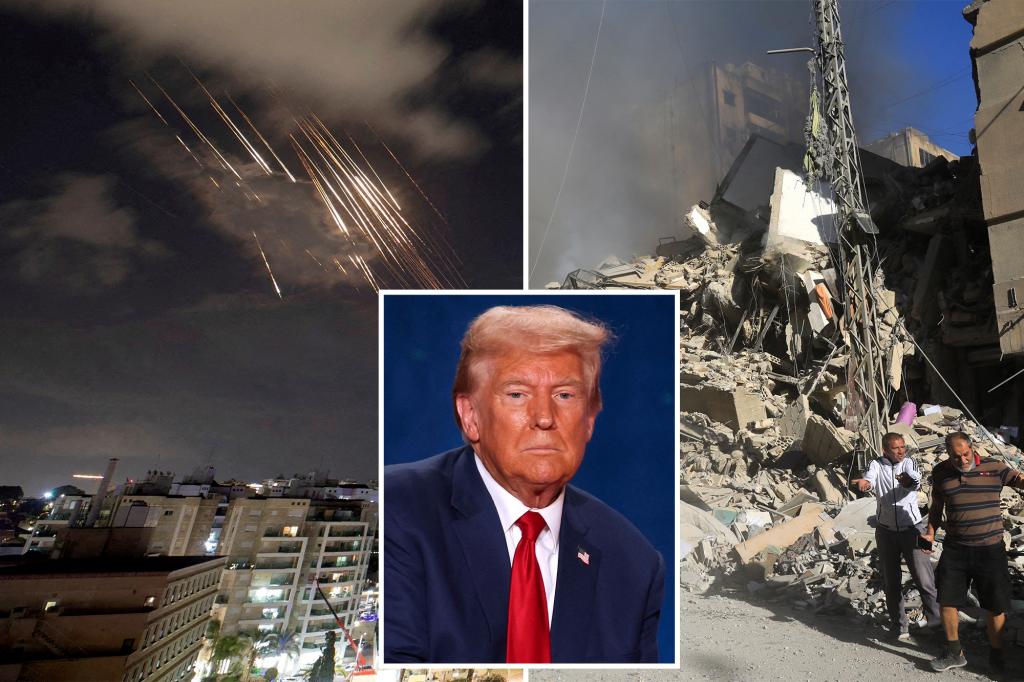Former President Trump criticized President Biden’s stance on Israel targeting Iran’s nuclear facilities. During a Q&A session with voters in Fayetteville, NC, Trump expressed his belief that the nuclear facilities are the primary target. He highlighted the importance of preventing Iran from obtaining nuclear weapons by taking out these facilities. Trump’s comments came in the wake of Iran launching 200 ballistic missiles into Israel, with the rockets being intercepted by Israel’s Iron Dome defense system. Despite the attack, only one death was reported in the West Bank.
In response to Iran’s attack, Israel has vowed retaliation with President Biden’s approval. However, the Biden-Harris administration has called for restraint from Israel, cautioning them against targeting Iran’s nuclear facilities. Biden emphasized the need for discussions with Israeli officials regarding their planned actions. The contrasting views between Trump and Biden on how to handle Iran’s nuclear ambitions and Israel’s response highlight the ongoing tensions in the region. The issue of preventing Iran from obtaining nuclear weapons remains a key concern for both former and current US administrations.
The debate over whether attacking Iran’s nuclear facilities is the appropriate response to prevent Iran from developing nuclear weapons continues to be a point of contention. Trump’s support for Israel targeting these facilities contrasts with Biden’s approach of urging restraint. The differing opinions reflect broader disagreements over how to handle Iran’s nuclear program and the broader Middle East conflicts. These discussions have far-reaching implications for regional stability and global security, as the threat of nuclear weapons in the hands of Iran remains a significant concern.
The recent exchange of missile attacks between Iran and Israel underscores the volatile nature of the region and the ongoing threat of conflict. Iran’s ballistic missile launch into Israel and Israel’s interception of the missiles demonstrate the high stakes involved in the conflict. The involvement of other nations, including the United States, adds complexity to the situation and raises concerns about escalating tensions. The need for diplomatic solutions to address the root causes of the conflict and prevent further violence is crucial for ensuring long-term peace and stability in the region.
The Biden administration’s efforts to navigate the situation in the Middle East, particularly in response to Iran’s actions, involve a delicate balance of supporting Israel while also advocating for restraint. The administration’s approach reflects a desire to avoid further escalation and promote dialogue to address the underlying issues causing conflict. Biden’s emphasis on discussions with Israel demonstrates a commitment to diplomatic solutions and multilateral engagement to address regional challenges. The ongoing tensions in the Middle East highlight the importance of a nuanced and coordinated approach to addressing conflicts and safeguarding global security.
Overall, the differing perspectives of former President Trump and President Biden on Israel’s response to Iran’s nuclear facilities reflect broader debates concerning Iran’s nuclear program and regional stability. The recent missile attacks between Iran and Israel and the involvement of other nations underscore the complexity of the situation. Diplomatic efforts to de-escalate tensions and address the underlying causes of conflict are crucial for promoting peace and security in the region. The ongoing discussions and decisions made by world leaders will have far-reaching implications for the future of the Middle East and global security.


